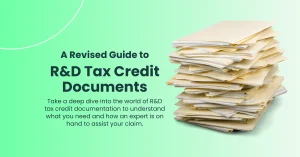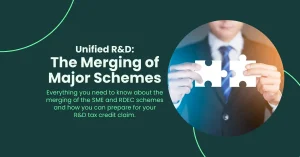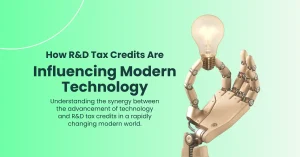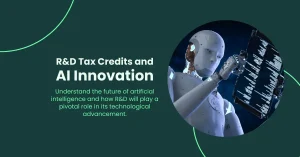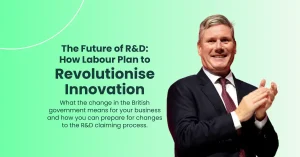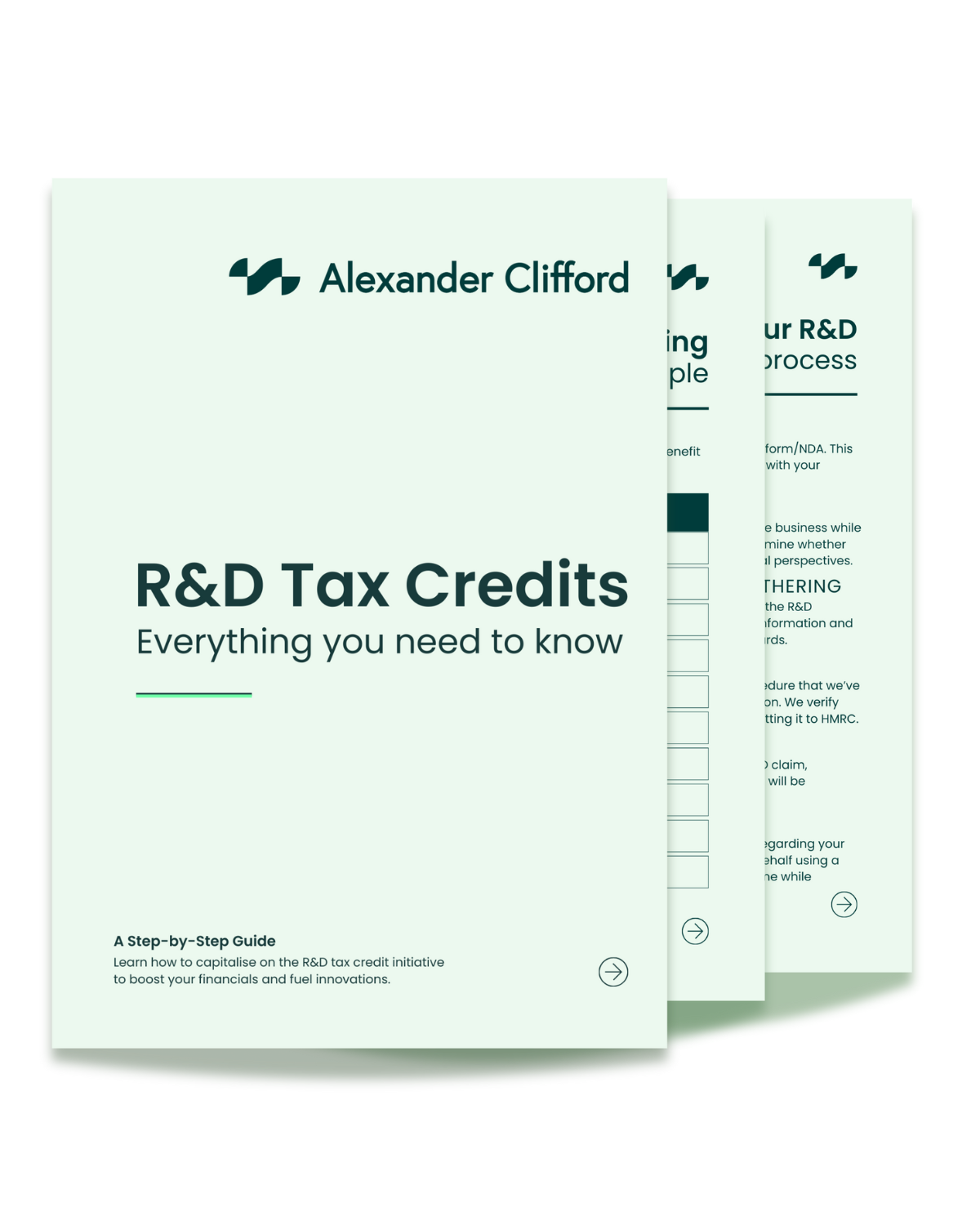Choosing between R&D tax credit specialists and accountants to maximise R&D claims
18 October 2023
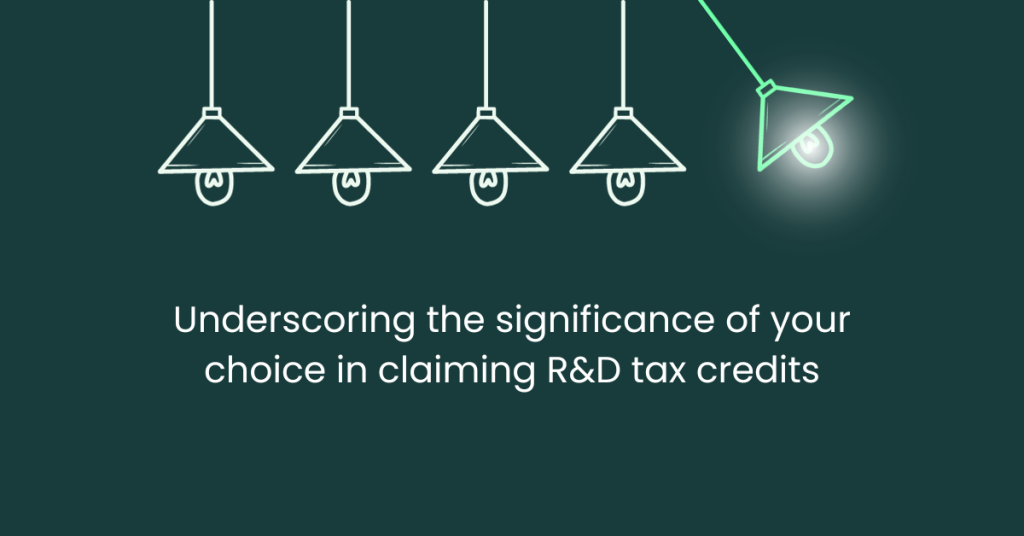
R&D tax credit specialists hold nuanced accountancy knowledge about R&D eligibility, legislation, the latest innovations and more as opposed to accountants. They input this knowledge into the technical and financial reports of every R&D claim, helping to fulfil the requirements of the tax incentive. Every R&D tax claim is unique due to the innovative and creative nature of eligible businesses. This article will shed some light on what you can expect from working with an R&D tax consultant as opposed to an accountant to help you with your decision of who to work with in claiming R&D tax credits.
What do R&D tax credit specialists do?
R&D tax specialists take leadership over completing claims for HMRC’s research and development incentive. Let’s be honest, the term “research and development” is very vague. It’s the R&D specialist’s job to understand the precise criteria in alignment with HMRC and to be able to present the R&D claim exactly as HMRC needs to view it. They learn about your project and accredit it to HMRC. This is through the technical report, also known as the technical narrative, which details your project from start to finish during a financial year.
Any business in the UK that is officially registered for corporation tax is eligible to submit a claim, regardless of its size or industry. Additionally, the company’s profitability status is irrelevant when making a claim, so if you’ve had a financially difficult year, you can also benefit from R&D!
The main distinction between R&D tax consultants and accountants is the exact nuance of R&D expertise they hold. The specialists know their stuff. In fact, they have to; R&D legislation is continuously evolving to prevent fraudulent claims and ensure the inclusivity of all genuine R&D businesses. You’ll find many R&D specialists have previously worked in the fields of R&D. This means they hold a deep-rooted passion for innovation, whether that’s an interest in green solutions, the transformation of agriculture, emerging pharmaceutical software, or something else. This passion makes all the difference in the claim; they can articulate a business’s project in a way that reflects the innovative and creative aspects; how you took something uncertain and advanced in your industry, even if you’re not in profit!
What do accountants do?
Accountants, on the other hand, play a multifaceted role in the financial world, encompassing a range of essential functions. They engage in financial reporting by creating balance sheets, income statements, and cash flow statements to provide an accurate overview of a company’s financial health. Accountants also leverage their expertise in budgeting, financial planning, and the development of financial strategies to facilitate effective financial management. They are responsible for essential bookkeeping tasks, including recording transactions, managing accounts payable and receivable, and reconciling bank statements to maintain precise financial records.
In management accounting, they provide vital financial data to support businesses in cost management, pricing, and resource allocation decisions. Through financial analysis, accountants evaluate a company’s financial performance, profitability, and stability, offering valuable insights for managerial and stakeholder decision-making. Furthermore, they ensure compliance with financial and tax laws and regulations, a task of paramount importance for public companies and those operating in regulated industries.
What can you expect from R&D tax credit specialists?
Access to tax expertise to empower your business decisions
By working with an R&D tax credit specialist, you’re closely working with a team with a wide breadth of expertise so you can fire away your questions. Any changes to R&D legislation that might impact your claim will be explained to you instantly. For example, in April 2023, it was announced you could now claim for cloud computing and software costs. It was a great privilege to deliver this update to our clients, knowing it would make a huge difference to their qualifying costs, leasing to an eventual bigger benefit. If your accountant isn’t part of the wider R&D community, they might miss out on these legislative changes to R&D legislation and fail to inform you of them.
You receive the tax benefit you’re entitled to, every penny!
To simplify, claiming for R&D involves a complex aspect of taxation that demands a deeper understanding of the crucial difference between Research and Development (R&D) and non-R&D activities. This distinction is not typically part of accountants’ standard job description.
The contents of your claim dictate what result you will receive, so a gap in R&D knowledge about what exactly is eligible could mean you miss out. Some of our clients have used their R&D benefit to make a crucial hire, invest in research, remove debt, and acquire new technology just to name a few examples. While your accountant could create a successful R&D claim, R&D tax credit specialists could help you receive 100% of what you’re eligible for.
The process is faster and smoother
R&D claims are complex; there are changing rates, different schemes based on the size of your company, and different rules for those in profit and those in a loss. The purpose of relying on R&D tax credit specialists is to simplify the entire process, so you can quickly receive your R&D benefit with minimal enquiries. They’re also deeply aware of what is eligible for R&D, so they can ensure you’re not missing out on anything. Perhaps something you’re doing every day, without you knowing counts as R&D! They validate this by asking you the right questions so they can ascertain this information at once.
Because of their exact and niche R&D tax credit knowledge and experience, you’ll most likely find that R&D tax credit specialists have additional compliance steps in place to reduce the risk of having enquiries from HMRC, or even worse, a penalty. Certain accountants may make simple mistakes that have unfortunate consequences for their R&D clients.
R&D tax specialists don’t need as much input compared to accountants
On the topic of saving time, if an accountant is unfamiliar with the contents of a technical narrative you most likely will experience long email chains and phone calls disrupting your daily tasks, requesting for more information as they complete this. This is not part of traditional training for accountants so they’ll be learning as they complete your claim.
Although the accountant can effectively outline the expenses associated with the claim, they won’t be capable of composing the technical explanations. Consequently, your team will have to undertake a lot of this task with limited assistance or direction from the accountant.
You’ll experience a confident process if R&D tax credit specialists lead you through the R&D claim, in a timesaving way. They’ll keep you in the loop about the process of your claim. If your team has got their heads down and focused on delivering a project, they don’t need your consistent input to get your claim ready for submission, so they can just let you know the result!
Prevent enquiries from HMRC
It can majorly eat into your time when HMRC have enquiries regarding your R&D tax claim. Some enquiries take up to a year to resolve. While some simple enquiries are just routine sport-checks, others are much more complicated. HMRC are cracking down on the abuse of R&D incentives so they are looking at each claim with scrutiny.
Your accountant could make a simple mistake of assuming a particular cost is eligible, such as alterations to the aesthetics of your solution. This mistake could jeopardise the entire claim, causing a fine. This is also the case when certain costs are reported under the wrong section or missed out. The importance of recognising the time and resources required to conclude an inquiry should not be overlooked. Handling the inquiry procedure without assistance can be both time-intensive and technically challenging.
The best way to reduce the chance of HMRC’s enquiries is to work with R&D tax credit specialists who know HMRC’s standards inside out.
Final thoughts on R&D tax credit specialists vs. accountants
Sometimes it’s tempting to just use your usual accountant to complete your R&D tax credit claim on your behalf. It’s important to keep in mind that R&D is a highly niche area of tax and accountants may only have a basic understanding of it. Alternatively, R&D tax credit specialists offer the breadth and depth of service required to create a successful claim. R&D experts possess extensive expertise in science and technology, allowing them to craft a technical description that showcases your project effectively. You can be confident that the likelihood of drawing the HMRC’s attention is reduced.
Let’s connect
As R&D tax credit specialists, we’ll assess your project for a potential R&D claim at no cost, as our approach is based on a no-win, no-fee policy. If your claim doesn’t result in benefits, you won’t incur any fees. We aim to promote R&D incentives and ensure businesses can explore their eligibility without worrying about hourly charges or unmet expectations in benefits. Our team has a track record of success; we’ve already secured over £83 million for our clients. Our in-house compliance processes go above and beyond to ensure we meet HMRC’s standards, leading to minimal enquiries and a fast delivery of the R&D benefit. Contact us today and we get you started on the journey to benefit from R&D tax credits.

